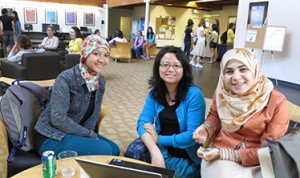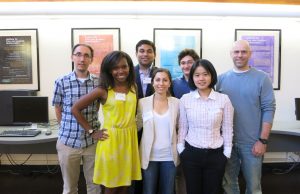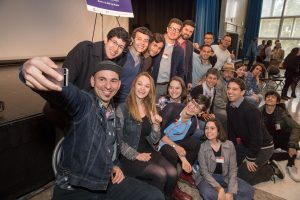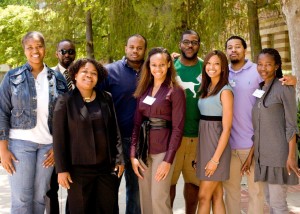 IPAM is committed to creating a professional and supportive environment for the disenfranchised and the underserved communities and welcomes participants with a diversity of experiences, ethnicity, and background. In current times, we have witnessed the horror of societal injustice playing out on the national stage. IPAM stands in solidarity with those who seek justice and equality
IPAM is committed to creating a professional and supportive environment for the disenfranchised and the underserved communities and welcomes participants with a diversity of experiences, ethnicity, and background. In current times, we have witnessed the horror of societal injustice playing out on the national stage. IPAM stands in solidarity with those who seek justice and equality
Equity and Diversity
Active involvement of women and members of underrepresented groups in all IPAM activities as organizers, speakers, panelists and participants is an essential goal of IPAM. All proposals for IPAM activities must include a plan for involvement of women and members of underrepresented groups. This plan is an important component in the proposal selection process. The IPAM directorate works closely with organizers of each event to ensure that these plans are successfully implemented. IPAM has started a new initiative to recruit and support participants from minority serving/primarily undergraduate serving institutions. Please contact IPAM for more details.
Support for National Programs for Underrepresented groups
 IPAM is a founding member of the Mathematical Sciences Institutes Diversity Initiative, a collaboration among the mathematical sciences institutes to increase the participation of underrepresented groups in the mathematical sciences. Along with the other NSF Math Institutes, IPAM co-sponsors the Modern Math Workshop every year at the SACNAS (Society for Advancement of Chicanos and Native Americans in Science) annual meeting, the Blackwell-Tapia conference, the Infinite Possibility Conference, the Spring Opportunities Workshops, the Latinx in Mathematics Conference, and much more. The Latinx in Mathematics Conference originated as an IPAM event in 2015. Due to its success it was repeated within MSID in 2018, and we are set to host the third of this series in 2022.
IPAM is a founding member of the Mathematical Sciences Institutes Diversity Initiative, a collaboration among the mathematical sciences institutes to increase the participation of underrepresented groups in the mathematical sciences. Along with the other NSF Math Institutes, IPAM co-sponsors the Modern Math Workshop every year at the SACNAS (Society for Advancement of Chicanos and Native Americans in Science) annual meeting, the Blackwell-Tapia conference, the Infinite Possibility Conference, the Spring Opportunities Workshops, the Latinx in Mathematics Conference, and much more. The Latinx in Mathematics Conference originated as an IPAM event in 2015. Due to its success it was repeated within MSID in 2018, and we are set to host the third of this series in 2022.
In addition, IPAM has hosted many additional meetings that serve and support women and/or minority groups. Examples include workshops for women organized by the Anita Borg Institute, the Conference for African American Researchers in the Mathematical Sciences (CAARMS), the Women in Mathematics Symposium, and others. IPAM also aims to be represented at other important national conferences and workshops such as the NAM MathFest or the Nebraska Conference for Undergraduate Women in Mathematics.
Improving the STEM Pipeline
 One of IPAM’s signature initiatives is the Research in Industrial Projects for Students (RIPS) program which introduces a diverse group of undergraduate students to industry sponsored research to facilitate their career progression and growth. As part of broadening the scope of this program, IPAM plans to host outreach workshops for college students at a junior level in institutions within underserved communities to promote interest and preparedness in STEM subjects. In the initial phase of this program we will leverage our strong ties with California State University at Northridge (CSUN).
One of IPAM’s signature initiatives is the Research in Industrial Projects for Students (RIPS) program which introduces a diverse group of undergraduate students to industry sponsored research to facilitate their career progression and growth. As part of broadening the scope of this program, IPAM plans to host outreach workshops for college students at a junior level in institutions within underserved communities to promote interest and preparedness in STEM subjects. In the initial phase of this program we will leverage our strong ties with California State University at Northridge (CSUN).
Inclusion
IPAM strives to create an inclusive community for all our participants, speakers, organizers, and staff. Our goal is to make everyone feel welcome and supported during their visit to IPAM. These values are encoded into IPAM’s Community Agreement which can be found in our website.
Leadership and Governance
 Diversity at all levels of IPAM’s operations is of critical importance. IPAM endeavors to ensure broad representation of underrepresented groups on its boards and its scientific staff. We value diversity on both the Science Advisory Board, which reviews proposals for scientific programs, and the Board of Trustees, which governs the organization. We ask board members to nominate women and minorities, and the director actively researches possible candidates. We also value diversity in the scientific leadership of IPAM. We publicize director and associate director positions in the AWM, NAM, and SACNAS newsletters and websites, and always state our desire for applications from women and minority candidates.
Diversity at all levels of IPAM’s operations is of critical importance. IPAM endeavors to ensure broad representation of underrepresented groups on its boards and its scientific staff. We value diversity on both the Science Advisory Board, which reviews proposals for scientific programs, and the Board of Trustees, which governs the organization. We ask board members to nominate women and minorities, and the director actively researches possible candidates. We also value diversity in the scientific leadership of IPAM. We publicize director and associate director positions in the AWM, NAM, and SACNAS newsletters and websites, and always state our desire for applications from women and minority candidates.
Services and Resources
IPAM offers assistance for workshop and long program participants with young children. IPAM’s child care resources webpage and program staff helps them locate and arrange child care. Additionally, a gift from the Berland Foundation has made it possible to offer child care grants to participants with primary parenting responsibility for young children, so that the parent can fully participate in the IPAM program.
IPAM actively collects and analyzes demographic data from program participants which is made publicly available through our Annual Reports that can be accessed here.